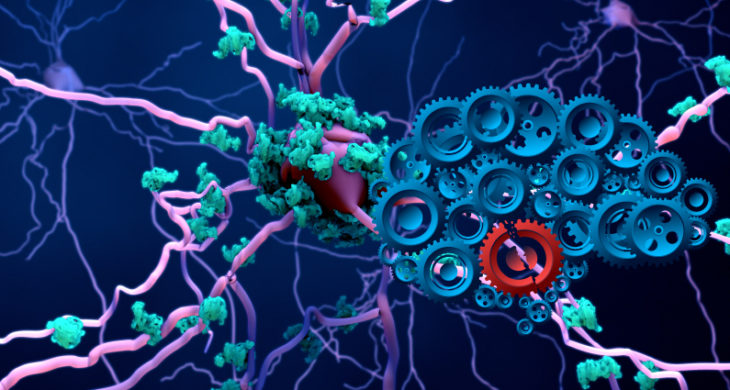
Date: 10th March 2022

Alzheimer’s disease (AD) has a much higher incidence in older women than in men, but the cause of this phenomenon has been unclear. There is often a spike of cognitive decline that occurs during the menopause transition where visceral adiposity, dysregulated energy homeostasis and bone loss is also seen. Now, researchers show follicle-stimulating hormone (FSH) as the major pathogenic factor in Alzheimer’s and that FSH blockade improves cognition.
AD is the most common progressive neurodegenerative disease affecting ~50 million worldwide, and whilst aging is the major risk factor, women are twice as likely to suffer from AD than men. The pathological hallmarks of AD include extracellular plaques that are mainly composed of aggregated polypeptide β-Amyloid (amyloid plaques) and intraneuronal neurofibrillary tangles (NFTs), consisting of hyperphosphorylated Tau aggregates. Although intensive efforts have been made in this field, the key molecular mechanism dictating AD pathogenesis still remains unclear and is reflected by a current lack of effective treatments.
Now, researchers at the Chinese Academy of Sciences, China, and the Icahn School of Medicine at Mount Sinai, US, led by Keqiang Ye and Mone Zaidi have shown that FSH acts directly on hippocampal and cortical neurons to accelerate amyloid-β and Tau deposition and impair cognition in mouse models of Alzheimer’s disease. Furthermore, blocking FSH action in these mice abrogated the AD-like phenotype. In contrast, overexpression of FSH in males promoted AD pathologies.
Ye’s lab had previously shown that that the C/EBPβ/AEP pathway plays a critical role in mediating AD pathologies and cognitive function, so they started to look for female hormones that were dramatically changed during menopause and selectively activated this pathway. During menopause serum levels of FSH rise dramatically, and link between FSH and body fat, thermogenesis, bone mass and serum cholesterol during menopause had already been discovered, making it an attractive target.
The team showed that FSH acted directly on hippocampal and cortical neurons to accelerate amyloid-β and Tau deposition and impaired cognition in mice displaying features of Alzheimer’s disease. Using a menopause mouse model, the team demonstrated that an anti-FSH antibody treatment was able to block FSH and resulted in the inactivation of the C/EBPβ/AEP pathway. This alleviated AD pathology and restored cognitive function.
To validate the finding, they deleted FSH receptor (FSHR) expression in neurons which abolished the binding of FSH to its receptor in the hippocampus. This again alleviated cognitive dysfunction and reduced the accumulation of amyloid plaques and phosphorylated Tau. Further validation of a role for this pathway was provide by knockdown of C/EBPβ in the AD mice model which decreased AD pathologies.
Whilst, these experiments showed a correlation with an increase in FSH due to induced menopause, the team also wanted to explore the role of FSH in male mice. Here, injection of recombinant FSH triggered AD pathology such as increased total tau, phosphorylated tau and increased amyloid plaques, it was also accompanied by cognitive decline with a reduced numbers of synapses in the brain.
Conclusions and future applications
The data here suggested that increase FSH associated with menopause binds to FSHR in neurons and activates the C/EBPβ/AEP pathway, leading to an exaggerated AD pathophysiology at this time. It opens up new opportunities for treating AD, and FSH-blocking agents may by the key.
In the near future, the team will focus on other known specific risk genes such as ApoE4 and explore their relationship with FSH – hoping to unravel why female ApoE4 carriers are at higher risk of developing AD. The team also highlight that a single FSH-depleting agent maybe able to treat AD, obesity, osteoporosis and dyslipidaemia, which is certainly an appealing opportunity.
The work here demonstrates that C/EBPβ/AEP signalling pathway acts as a core factor in AD, and is likely to extend to other age-dependant diseases. It may also help answer how a variety of risk factors mediate neurodegenerative disease – converging on the activation of this pathway.
Understanding the biology of the disease is crucial in accelerating new and novel treatments for this disease. Inroads have been made recently, with a new approach to removing tau protein by enhancing the activity of proteasomes and an anti-tau antibody that reduced accumulation of tau pathology. Therapeutic depletion of circulating B cells at the onset of the disease has been shown to eliminates immunoglobin deposits in the brain and blocks AD manifestation. Researchers have also identified genetic and chemical modulators that restore lipid homeostasis as a result of ApoE4 disruption. Together, these data and the revelation of FSH’s role in AD will increase our understanding of this highly complex disease. It is hoped this will translate to an effective yet simple ways to alleviate or halt the progression of AD symptoms in the near future, and will open up new avenues to accelerating novel therapeutic strategies.
For more information please see the press release at the Shenzhen Institute of Advance Technology
Xiong, J., Kang, S.S., Wang, Z., Liu, X., Kuo, T.-C., Korkmaz, F., Padilla, A., Miyashita, S., Chan, P., Zhang, Z., et al. (2022). FSH blockade improves cognition in mice with Alzheimer’s disease. Nature.
https://doi.org/10.1038/s41586-022-04463-0
http://eha.3a7.mywebsitetransfer.com/new-approach-removing-toxic-proteins-alzheimers/
http://eha.3a7.mywebsitetransfer.com/immunotherapy-alzheimers-disease-reduces-tau-pathology/
http://eha.3a7.mywebsitetransfer.com/therapeutic-depletion-b-cells-reverses-alzheimers-disease-progression/
http://eha.3a7.mywebsitetransfer.com/the-alzheimers-disease-risk-apoe4-variant-disrupts-lipid-homeostasis/


